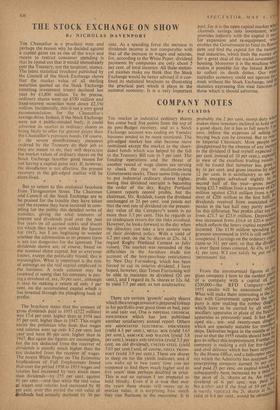THE STOCK EXCHANGE ON SHOW
By NICHOLAS DAVENPORT
THE Chancellor is a practical man and perhaps the reason why he decided against a capital gains tax as one of the ways and means to restrict consumer spending is that he found out that it would immediately cost the Treasury, not the taxpayer, money. The latest statistical brochure published by the Council of the Stock Exchange shows that the market value of all sterling securities quoted on the Stock Exchange (omitting investment trusts) declined last year by £1,800 million. To be precise, ordinary shares went up £550 million and fixed-interest securities went down £2,350 million. Incidentally, this is not a very good recommendation for . the Chancellor's savings drive. Indeed, if the Stock Exchange were not a public-minded body, it could advertise its market in ordinary shares as being likely to offer far greater prizes than the Chancellor's premium bonds. Of course, if the severe disinflationary measures ordered by the Treasury do their job as they are meant to do. they will depreciate the market values of ordinary shares on the Stock Exchange (another good reason for not having a capital gains tax). If, however, the disinflation is not effective, the present recovery in the gilt-edged market will be short-lived.
But to return to this statistical brochure from Throgmorton Street. The Chairman and Council of the Stock Exchange are to be praised for the trouble they have taken and the expense they have incurred in com- piling for the public this detailed series of statistics, giving the total amounts of interest and dividends paid over the past five years on all quoted stocks and•Shares (to which they have now added the figures for 1947), but 1 am beginning to wonder whether the information in its present form is not too dangerous for the ignorant. The dividends shown are, of course, based on the nominal share capital, but as everyone I, [tows. except the politically biased, this is meaningless. What is important is the rate of earnings on the real capital employed in the business. A trade unionist may be incensed at seeing that his company is pay- ing a dividend of, say, 30 per cent.; although it may be making a return of only 3 per cent. on the accumulated capital which it has invested through the ploughing back of profits. * * The brochure states that the amount of gross dividends paid in 1955 (£522 million) was 17.4 per cent. higher than in 1954 and 85 per cent. higher than in 1947. This might excite the politician who finds that wages and salaries went up only 8.2 per cent. last year 'and were 80 per cent. higher than in 1947. But again the figures are meaningless, for the tax deducted from the receiver of dividends is usually much higher than the tax deducted from the receiver of wages. The recent White Paper on The Economic Implications of Full Employment found that over the period 1938 to 1955 wages and salaries had increased by very much more than dividends-by 255 per cent. against 80 per cent.-and that while the real value of wages and salaries had increased by 40 per cent. over this period the real value of dividends had actually declined by 30 per cent. As a spending force the increase in dividends income is not comparable with that of the increase in wages and salaries, for, according to,the White Paper, dividend payments by companies are only about 5 per cent. of total incomes. All these statisti- cal niceties make me think that the Stock Exchange would be better advised if it con- fined its statistical brochure to illustrating the practical part which it plays in the national economy. It is a very important
whit which which o$ ati t Y entI. Which mixt,� for:1 d lit nave
part, for it is the open capital market channels savings into investment, provides industry with the capital it for expansion and re-equipment, enables the Government to fund its fl debt and •find the capital for the nit ised industries, which finds the mone for a great deal of the social investrn housing. Moreover it is the machine makes it possible for the Inland Re to collect its death duties. Our capitalist economy could not operate week without the Stock Exchange, at statistics expressing this vital functic those which it should advertise.










































 Previous page
Previous page